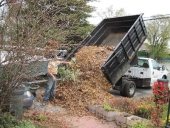posted 9 years ago
I have got a two geothermal projects done with a third I want to construct due to the success of the first two.
In all honesty I think you are being far more concerned with a technical aspect that is not required. The basic premise of geothermal is to minimize the amount of heat needed in a space to do what you wish, whether it is to live comfortably, grow vegetables, or keep livestock well managed. In my house, located in Maine where 4 feet underground it is a constant 57 degrees, I utilize geothermal to heat my house in the winter. I don't rely upon it completely, but by adding 400 tons of rock under my slab I have mass in the center of my house, while on the outsides I sealed in the heat and keep out the cold with insulated panels. With a sophisticated radiant floor heating system, now it is only a matter of running warm water through the floor and not hot water. (Think 100 degree water here and not 180 degree water like most heating systems). I could have chose to go with solar gain to reduce my heating needs, but in Maine's fickle sunshine in the winter, I went with a super insulated house and multiple choices for heating fuels. Soon I hope to tie in solar hot water to help heat my house some more and further draw down my energy consumption.
Keeping my stock tanks free of ice is rather easy; keep the water above 32 degrees! You can do that by sinking in a plastic culvert vertically 10 feet down. That is a cost of only $100. Then place your stock tank over the pipe. Insulate the stock tank well on its sides and on top...only big enough to let your animals drink...and the heat rising up from the ground below warms the bottom of the stock tank staving off a 1500 watt electric heater in your tank keeping ice at bay. Better yet, the water is the ideal temperature for livestock to thrive on.
Geothermal is not overly complicated. its just moving constant, low heat to a point that has variable in heat and cold. In doing so you take out the highs and lows and save yourself in energy costs. The contractors are required because they must look at your footprint and decide what equipment will work and what they have to work with. Obviously they cannot destroy wetlands, and places with ledge 6 inches down would be problematic too, and if the house lot is 400 acres or 1/4 of an acre makes a difference as well. But a competent person can go to the NRCS Web Soil Survey site and get a soil report of their land, and deduce if they need to sink a well or can excavate loops or long runs. They can also determine if they can rent the equipment to do it themselves and make the connections. Hooking up pex is the easy and honestly, not that expensive.
I guess what I am saying to Permies everywhere is don't be intimidated by geothermal.








